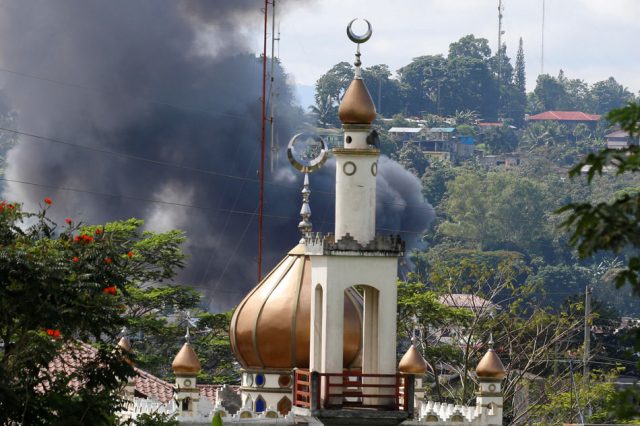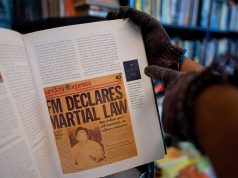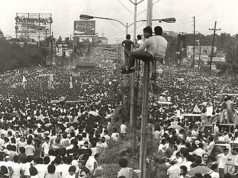
MANILA, Philippines — (UPDATE 6 – 3:26 p.m.) There is no factual basis for Proclamation 216, by which President Rodrigo Duterte placed the whole of Mindanao under martial law, the Supreme Court was told on Tuesday, the first day of oral arguments on three petitions to nullify the declaration.
The petitions were filed separately by opposition members of the House of Representatives, the Makabayan bloc of lawmakers along with indigenous people and other sectoral representatives from Mindanao, and four residents of Marawi City, where fighting between extremist gunmen and government forces prompted Duterte to declare martial law on May 23.
The three petitions, which have been consolidated, are being heard separately from two other petitions — one filed by a group including former Senator Rene Saguisag, former Commission on Elections chairman Christian S. Monsod, former Commission on Human Rights chair Loretta Ann P. Rosales, former Philippine Health Insurance Corp. president Alexander A. Padilla, and detained Senator Leila de Lima; the other by former Senator Wigberto E. Tañada and several Catholic bishops namely: Manila Auxiliary Bishop Broderick Pabillo, Bishop Antonio Tobias, Bishop Emeritus Deogracias Iniguez — that ask the high court to compel Congress to convene in joint session to debate Duterte’s martial law proclamation.
Lawyers for the petitioners at Tuesday’s hearing all said the violence wreaked by the Maute group and other extremist groups on Marawi, where fighting has continued for three weeks, might constitute terrorism but could not be defined as rebellion or invasion, the grounds by which the Constitution allows martial law to be declared and the privilege of the writ of habeas corpus to be suspended.
“Acts of terrorism are not necessarily equivalent to actual rebellion and the consequent requirement of securing public safety,” Albay Representative Edcel Lagman, representing the opposition lawmakers, said, adding that Justice Secretary Vitaliano Aguirre II had admitted to this.
Duterte, he stressed, “must be factually correct” and “may not be arbitrary or capricious in appreciation of the facts.”
Worse, he added, some of Duterte’s “factual assertions” to justify martial law “turned out to be inaccurate or hyberbolic.”
Proclamation 216 cited, among others, the supposed occupation of a hospital and the beheading of a police officer, both of which never happened.
“It stands to reason that when the President exercises a very serious, extraordinary power, he must be supported by the necessary coordination, recommendation, and consultation from the ranking officials of the defense and military sectors,” Lagman said.
“In the exercise of this extreme, special emergency power, the president should not act in solitude because it would affect the multitude,” Lagman stressed.
He noted that defense and military officials had declared that they had not recommended martial law and that a video that purportedly showed the Maute brothers and Abu Sayyaf leader Isnilon Hapilon planning the takeover of Marawi was recovered by government forces two days after martial law was declared and could not, therefore, have been part of Duterte’s basis for his proclamation.
Justice Mariano del Castillo did not seem too convinced about Lagman’s arguments, however.
“The military casualty count as of last Sunday is already 58 soldiers, Congressman,” del Castillo told Lagman. “Dead soldiers of ours. And there are 25,000 evacuees now in Iligan City. So for you the situation is still not that serious for Martial Law to … I mean, Martial Law will only be with us for 60 days, assuming that he [Duterte] won’t lift the proclamation earlier. With all the safeguards, I don’t know why you are so worried.”
To this, Lagman replied: “Your honor, all of these subsequent killings, including civilians and children, we commiserate with the government with respect to the deaths of many soldiers. But these are all circumstances after the fact of the declaration of Martial Law. They are the aftermath of an ill-conceived declaration, your honor. So this will not in any way validate the continuance of Martial Law. And we personally believe that the Armed Forces of the Philippines has the capability to suppress this terrorism in Marawi City without the President imposing Martial Law.”
Lagman also argued that it has become “imperative for the Supreme Court to exercise its special and specific jurisdiction to review the sufficiency of the factual basis of the subject declaration and suspension” because Congress “has reneged on its mandated duty” to convene in joint session to tackle martial law.
Another lawyer for the petitioners, Cristina Yambot, noted that Duterte’s proclamation “failed to show rebellion simultaneously occurring in the entire Mindanao” even as she stressed that “capability, capacity, plans or objectives” do not constitute rebellion.
Lawyer Ephraim Cortez, appearing for the Makabayan bloc and its co-petitioners, told the tribunal that Proclamation 216 “is null and void since it is vague and (based on) mere speculation.”
In the consolidated comment it submitted to the Supreme Court earlier, the Office of the Solicitor General claimed that the Marawi crisis was triggered by a government operation to arrest Hapilon based on intelligence reports supposedly obtained as early as May 18 of the terrorists’ plan to take control of the city.
The OSG claimed that the extremists’ plan was to torch Marawi on May 26, the start of Ramadan, as a signal to other supposed uprisings across Mindanao.
On Monday, Independence Day, Armed Forces chief of staff Lieutenant General Eduardo Año, bared a supposed plot by the extremists to also occupy Iligan City after Marawi and kill as many non-Muslims as they could there.
While Proclamation 216 only cites rebellion as a basis for martial law, Solicitor General Jose Calida later claimed the Maute “rebellion” had “transmogrified” into a foreign invasion, citing the presence of extremists from abroad who were among the gunmen fighting government forces in Marawi.
But Lagman argued that “the mere presence of foreign soldiers in Marawi City assisting the Maute group will not constitute rebellion” as he pointed out that “no less than the military establishment admitted has that there are only a handful of foreign soldiers who are provocateurs or agents of ISIS (Islamic State of Iraq and Syria).”
Neither, he said, did raising the ISIS flag constitute rebellion since this is propaganda the extremists have been resorting to for a long time.
He said the evacuation of tens of thousands of Marawi residents and the deaths from the fighting all occurred after the “ill-conceived” declaration of martial law and were not a basis for its proclamation.
Lawyer Marlon Manuel, representing the Marawi residents, stressed that the 1987 Constitution explicitly describes martial law as “an instrument of last resort.”
He added that “the message of the (1987) Constitution is very clear: ‘Never again to martial law’,” or at least one similar to that declared by the Ferdinand Marcos in 1972, which marked the beginning of a 14-year dictatorship marked by brutality and plunder.
Lagman also alluded to this when he cited Duterte’s statements describing Marcos’ martial law as “very good” and vowing to “replicate it with equal harshness.”
Lawyer Ray Paolo Santiago cited US jurisprudence that “civil authorities have to be actually overthrown” before martial law can be resorted to. “The question now is who has the burden of proof,” he said, adding that it was “definitely with the State.”
Manuel also said it was not only Proclamation 216 that was being put to the test by their petitions but the mechanism laid down by the Constitution allowing the Supreme Court to review a declaration of martial law.
Lagman also pointed out that the Marawi crisis was the offshoot of a government initiative — the operation to arrest Hapilon — which Duterte confirmed in his report to Congress on the declaration.
He also noted the reply of Lieutenant General Salvador Mison Jr., the Armed Forces deputy chief of staff, when ashed during the military briefing for the House, when asked the difference between the Marawi crisis and the 2013 emergency in Zamboanga City that involved fighters of the Moro National Liberation Front.
Mison said that in the “Zamboanga siege, sila po ang pumasok. Sa Marawi, tayo po ang nagsimula (In the Zamboanga siege, they entered. In Marawi, we started it).” (with a report from Lira Dalangin-Fernandez, InterAkson)









